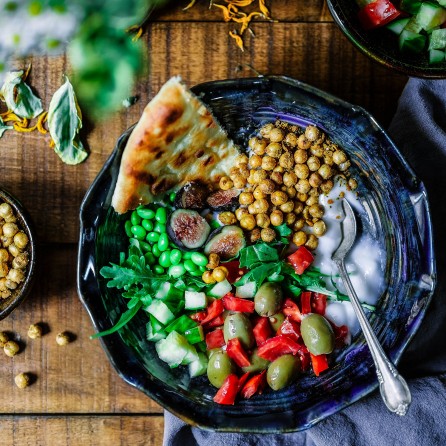
Changing your diet can be hard at first, so we have compiled some tips to help you along the way. Increasing intake of proteins, carbohydrates, fruit, vegetables and extra virgin olive oil, switching to plant-based milks and reading labels carefully are all good starting points. Avoiding frying and eating seasonally can help you to eat more healthily, and batch cooking will keep healthy, beneficial food on hand to reduce the temptation of choosing something unhealthy.
Firstly, what is a plant-based wholefood diet, plus seafood, minimizing saturated fat?
Note: this is not a complete list of what you can and can’t eat – just a guide to get you started
There are lots of recipes on our website and in the Overcoming MS cookbook. Check out our list of cookbooks recommended by people following the Overcoming MS program (OMSers). You can adapt vegan recipes by excluding oil or coconut products.
Examples of some delicious recipes you can easily make Overcoming MS-friendly:
- Ramen noodle soups
- Pasta dishes
- Salads
- Baked potatoes
- Rice dishes
- Sushi
- Risottos
- Flatbread
- Mezze dips
- Buddha bowls
- Grilled fish
- Cheese-free pizza
- Homemade veggie burgers
- Veggie chilli
- Soups
- Cauliflower rice
- Vegetable stews
- Breakfast cereals
- Overnight oats
- Homemade granola
- Dahls
- Vegetable or fish curries
- Smoothies
- Bean burritos.
There are plenty of websites out there with Overcoming MS-compliant recipes. You can update vegan or pescatarian recipes to make them Overcoming MS-compliant. Try searching for ‘fat-free’ and ‘whole foods’ along with ‘pescatarian’ and ‘vegan’ recipes.
You can read a full study about practical tips for preparing healthy and delicious plant-based meals here.